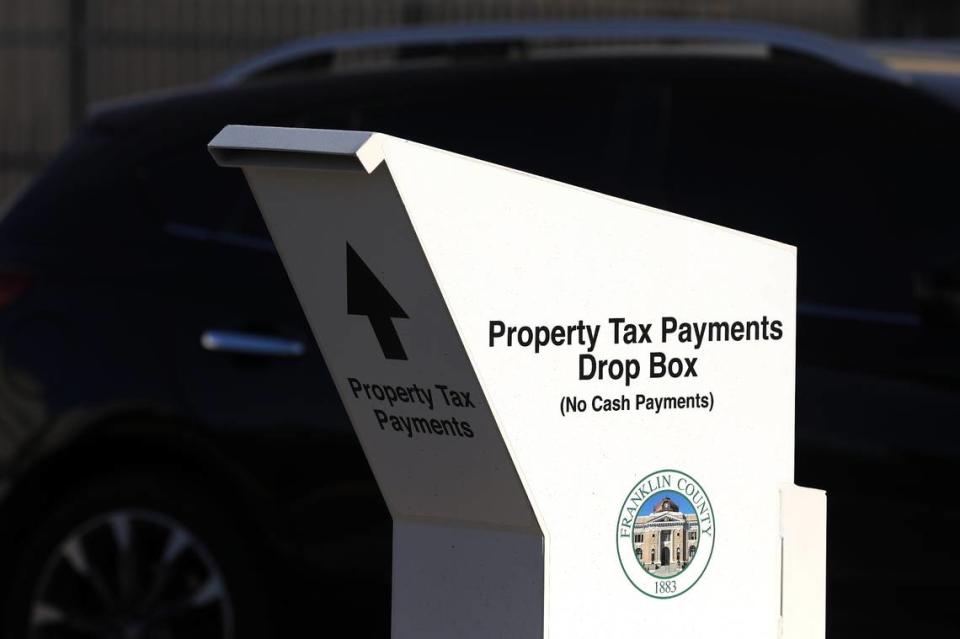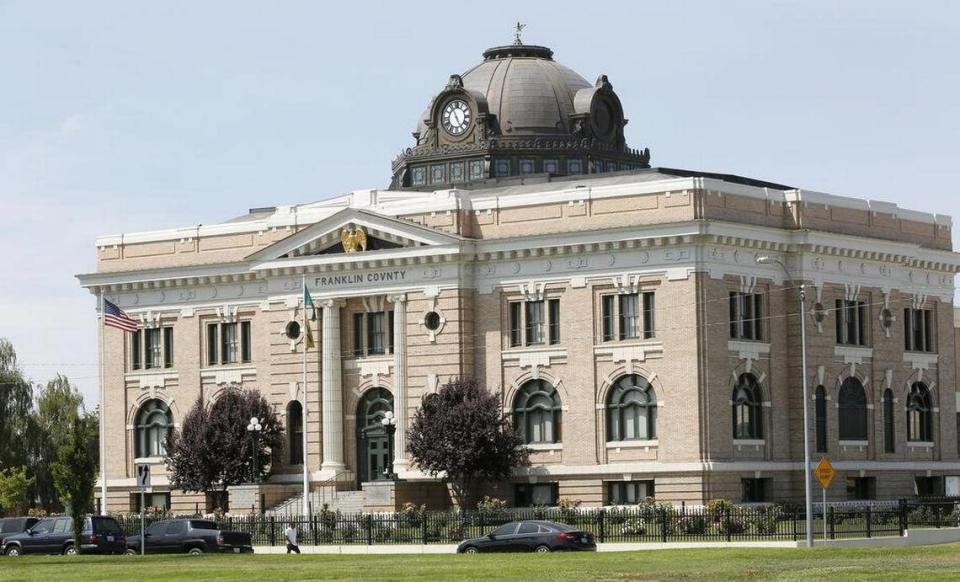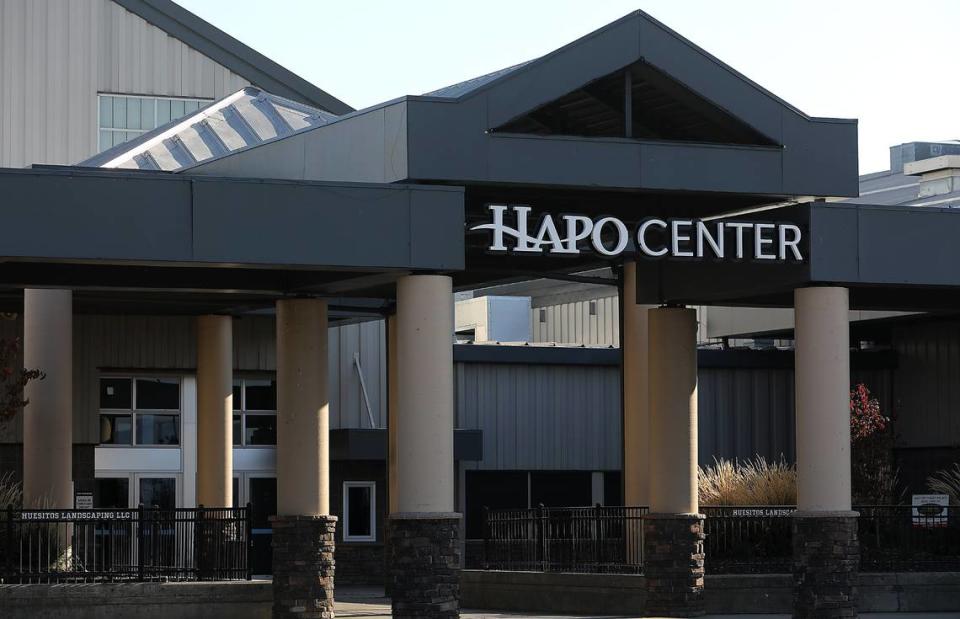Franklin Co. heading toward multi-million budget crisis. Can it avoid a tax increase?
For years Franklin County has tried to run lean when it comes to staffing and expenses. Now its hurtling toward a budget crisis that could mean a big hit to law enforcement and the court system as those costs have ballooned in recent years.
County commissioners were told this week they’re looking at a potential shortfall that could be as much as the one-third of the cost of the current law enforcement and court budget, or 15% of its total $50 million budget.
Clark Worth, a consultant with Consor, presented the results of a months-long independent review of the county’s finances this week. Along with those results, he also gave commissioners some potential options for making up the difference, though some proposals were harder to swallow than others.
From more drastic measures like asking voters to approve new sales taxes or selling off the HAPO Center to a combination of smaller efforts such as aggressively searching for grants, County Administrator Mike Gonzalez said the review gave them a lot to think about and a variety of options to help avoid having to raise property taxes.
The worst case scenario would see Franklin dealing with a $7.5 million shortfall, but extra grant funding this year is expected to help narrow that gap.
They’re estimating the county will be about $3 million in the red after 2024 revenue collections if costs aren’t cut or extra funding isn’t found.
The single largest expense in Franklin County is employee salaries, with 295 employees. That includes the sheriff’s office, correction officers, prosecutors, court employees, auditors, assessors and more.
Between 50 and 60 percent of their current funds go to law enforcement or criminal justice related salaries.

How did they get to this point?
County budgets across Washington state have seen huge increases over the past decade as costs for services and employees climb.
The Tri-City Herald reviewed budget documents from 2014 to 2024, which showed that the budgets of all of the counties used as comparison points by Consor had seen costs double in a decade.
State and federal funding made available during the COVID-19 pandemic helped alleviate a lot of the excess pressure in recent years, but most of that money ended with 2023 and does not seem likely to return. Franklin County saw its grant funding almost double during that period.
Meanwhile, traditional revenue sources have not kept up because of state limits on how much property taxes counties can collect.
Property taxes are the primary source of funding for counties in Washington, with sales and use taxes coming in a distant second. During the pandemic, grant funding leapfrogged ahead of sales and use taxes for a few years in some counties like Franklin.

Property tax collections haven’t kept up because counties can ask for only a 1% levy collection increase over the total levy amount each year without going to voters for approval.
And, as the fastest growing county in the state, Franklin’s expenses have grown by nearly $17 million, or 52%, since just 2018. That 1 percent amounts to about $100,000.
Franklin County hasn’t asked voters for what’s known as a “levy lid lift” since the current rules were set in place in 2001. Instead they’ve looked to sales and use taxes for specific purposes such as criminal justice and public safety needs.
That has lead to the county’s effective tax rate dropping nearly 40% since 2018, or from $1.22 per $1,000 of assessed value to $0.75.
That typically happens when more houses are added, spreading out the total tax burden among more properties.
While that growth means less of a tax burden for individual homeowners, it comes with growing expenses for cities and counties, especially when it comes to public safety and infrastructure.
Franklin County spends more than half of its $50 million budget on public safety and its court system.
In that same time period, looking at budgets from 2018 through 2024, property and sales tax have grown in terms of total dollars, but are making up a smaller slice of the overall pie.
Compared to Benton County and others with similar populations and demographics, such as Chelan and Grant counties, Franklin is also bringing in significantly less money per person, and in terms of real dollars, due to a much smaller property tax and sales base.
At $8.6 billion, Franklin County’s property tax base is about two-thirds the size of Chelan County’s and 15% smaller than Grant County. Their sales and use tax collection is similarly smaller.
Benton County has a property tax rate of $21.3 billion and brings in nearly three times as much sales and use tax as Franklin, despite only having about double the population.
Gonzalez said that while Pasco has grown considerably, its shopping options haven’t kept up leading to the area bleeding retail dollars across the river to Kennewick and Richland.
He said it’s especially apparent when you look at non-grocery items such as clothing and shoes.
He said Pasco’s loss of a potential Costco store was a major blow for the city and county, but he hopes that upcoming major projects such as the Broadmoor Development, industrial projects such as the Amazon distribution warehouses and Darigold plant and other developments can help put the county on a better financial footing.

“We need to develop our tax base if we want to compete as a county,” Gonzalez said.
The challenge they face is creating an environment where revenue can keep up with the staggering growth the county is expected to see, with Pasco looking at an expected population growth of up to 60,000 people over the next 20 years.
What are the options?
While Consor said that putting a levy lid lift before voters would be the single most impactful way of raising money, Franklin commissioners don’t think voters will support it.
The commissioners were presented with more than a dozen options, but a few stood out.
Franklin County has not collected a 911 communications sales tax that it could put before voters. That tax, which can go up to .02% can be used to offset costs for emergency dispatch services, facilities and technology. While those costs only run less than $1 million annually in their budget, Gonzalez said there are some significant needs coming.

Both counties have been looking at the cost of upgraded emergency communication towers and antiquated radio systems, this sales tax could be used to pay for that with a potential total cost of up to $20 million for upgrades over the next decade.
Consor also compared Franklin County’s financial policies with peers and found that Franklin only had in place two of the 15 most common practices.
One of those two policies they have is out of compliance with their own policy because they haven’t been able to set aside enough money in a reserve fund. The county’s other financial policy is for investment and bond management, which they have been able to keep up with.
“We’ve never really had financial strategies here, clearly we need to plan more and look at the future,” Gonzalez said. “Ultimately we need to come up with a roadmap on how we’re going to survive for the next 15 years.”

Some key policies that can be implemented are long-term and capital planning, debt management, grant planning and others that will help the county guide its spending.
Worth said that lack of clear policies has led the county to seek solutions that will leave them with bigger bills in the future.
He pointed to the county shifting road levy funds, warning that putting off roadworks means a single natural disaster could mean a crisis for their budget.
“I look at road levy shift as borrowing from the future, so if you’re not spending money on road maintenance now, you’re going to have to spend a lot more later,” he said. “The other thing is postponing capital investments in new and upgraded facilities, that’s another area where I think you’re borrowing from the future.”
Other options included selling county owned property for a one-time cash injection. Worth estimated selling the HAPO Center could net $50 million, while nearby county owned property could net an additional $30 million. The county also owns 13 other parcels that could fetch up to $750,000 each.

Selling the HAPO Center doesn’t seem likely, as the county recently brought on a new management group to help maximize its profitability and potential uses.
Worth also recommended hiring a full-time grant coordinator and engaging in more aggressive lobbying with lawmakers on issues such as public defender and prosecutor funding.
Gonzalez recently hired a government affairs coordinator to help with some of these goals.
Worth said that there’s no silver bullet to fix all of the county’s finance worries, but a combination of these strategies will help get them back on track, and hopefully avoid more aggressive cost-cutting measures such as reducing staff.
He said the county also should look at adopting a two-year budget cycle because it helps stabilize spending.
The county’s staffing, Worth said, was already leaner than most of its peers, and was underpaid in nearly every category compared to counties they compete with for employees. At just 2.8 employees per 1,000 residents, Consor said they’re already running one of the leanest county governments in the state.
